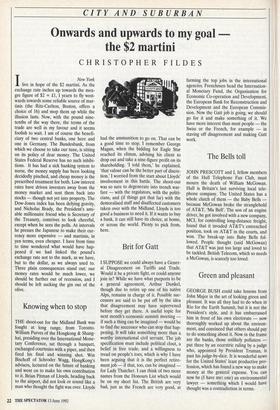Knowing when to stop
THE shoot-out for the Midland Bank was fought at long range, from Toronto. William Purves of the Hongkong & Shang- hai, presiding over the International Mone- tary Conference, sat through a banquet, exchanged courtesies with a piper, and then fired his final and winning shot. Win Bischoff of Schroder Wagg, HongKong's advisers, lectured on the future of banking and went on to make his own contribution to it. Brian Pitman of Lloyds, heading back to the airport, did not look or sound like a man who thought the fight was over. Lloyds had the ammunition to go on. That can be a good time to stop. I remember George Magan, when the bidding for Eagle Star reached its climax, advising his client to drop out and take a nine-figure profit on its shareholding. 'I told them,' he explained, `that valour can be the better part of discre- tion.' I worried from the start about Lloyds' involvement in this battle. The shoot-out was so sure to degenerate into trench war- fare — with the regulators, with the politi- cians, and (if things got that far) with the demoralised staff and disaffected customers taken over with the Midland. Lloyds is too good a business to need it. If it wants to buy a bank, it can still have its choice, at home, or across the world. Plenty to pick from, here.


















































 Previous page
Previous page